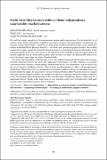Multi-Item Mechanisms without Item-Independence: Learnability via Robustness
Author(s)
Brustle, Johannes; Cai, Yang; Daskalakis, Constantinos
Download3391403.3399541.pdf (1.598Mb)
Publisher Policy
Publisher Policy
Article is made available in accordance with the publisher's policy and may be subject to US copyright law. Please refer to the publisher's site for terms of use.
Terms of use
Metadata
Show full item recordAbstract
© 2020 ACM. We study the sample complexity of learning revenue-optimal multi-item auctions. We obtain the first set of positive results that go beyond the standard but unrealistic setting of item-independence. In particular, we consider settings where bidders' valuations are drawn from correlated distributions that can be captured by Markov Random Fields or Bayesian Networks - two of the most prominent graphical models. We establish parametrized sample complexity bounds for learning an up-to-ϵ optimal mechanism in both models, which scale polynomially in the size of the model, i.e. the number of items and bidders, and only exponential in the natural complexity measure of the model, namely either the largest in-degree (for Bayesian Networks) or the size of the largest hyper-edge (for Markov Random Fields). We obtain our learnability results through a novel and modular framework that involves first proving a robustness theorem. We show that, given only "approximate distributions" for bidder valuations, we can learn a mechanism whose revenue is nearly optimal simultaneously for all "true distributions" that are close to the ones we were given in Prokhorov distance. Thus, to learn a good mechanism, it suffices to learn approximate distributions. When item values are independent, learning in Prokhorov distance is immediate, hence our framework directly implies the main result of Gonczarowski and Weinberg[36]. When item values are sampled from more general graphical models, we combine our robustness theorem with novel sample complexity results for learning Markov Random Fields or Bayesian Networks in Prokhorov distance, which may be of independent interest. Finally, in the single-item case, our robustness result can be strengthened to hold under an even weaker distribution distance, the Levy distance.
Date issued
2020Department
Massachusetts Institute of Technology. Department of Electrical Engineering and Computer Science; Massachusetts Institute of Technology. Computer Science and Artificial Intelligence LaboratoryJournal
EC 2020 - Proceedings of the 21st ACM Conference on Economics and Computation
Publisher
ACM
Citation
Brustle, Johannes, Cai, Yang and Daskalakis, Constantinos. 2020. "Multi-Item Mechanisms without Item-Independence: Learnability via Robustness." EC 2020 - Proceedings of the 21st ACM Conference on Economics and Computation.
Version: Final published version